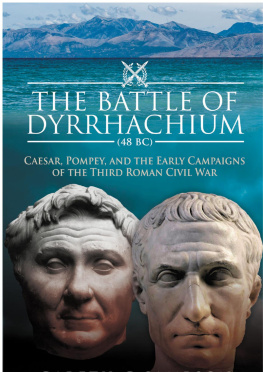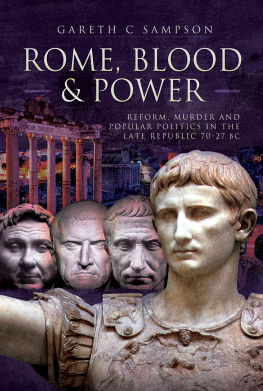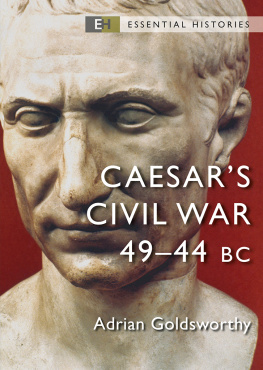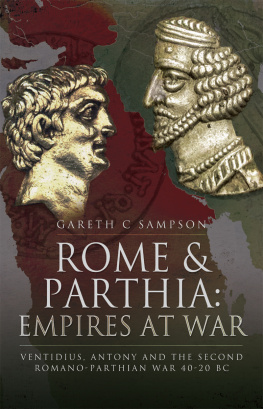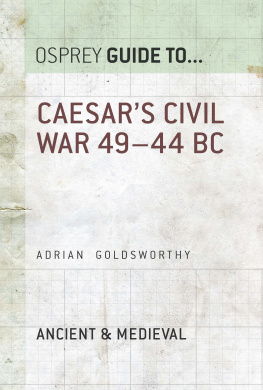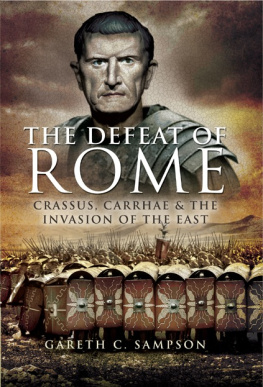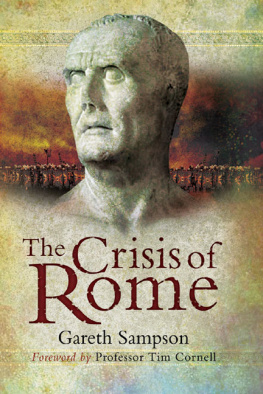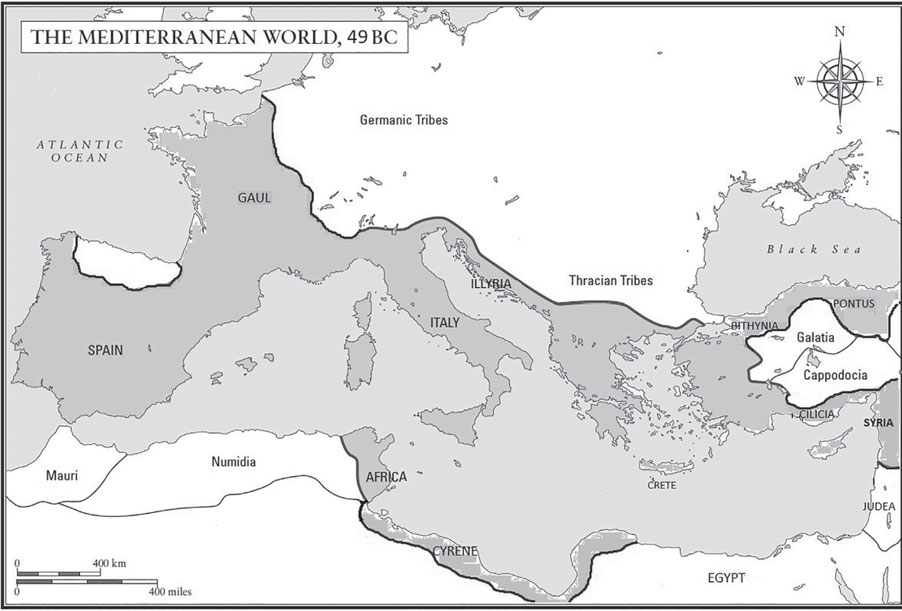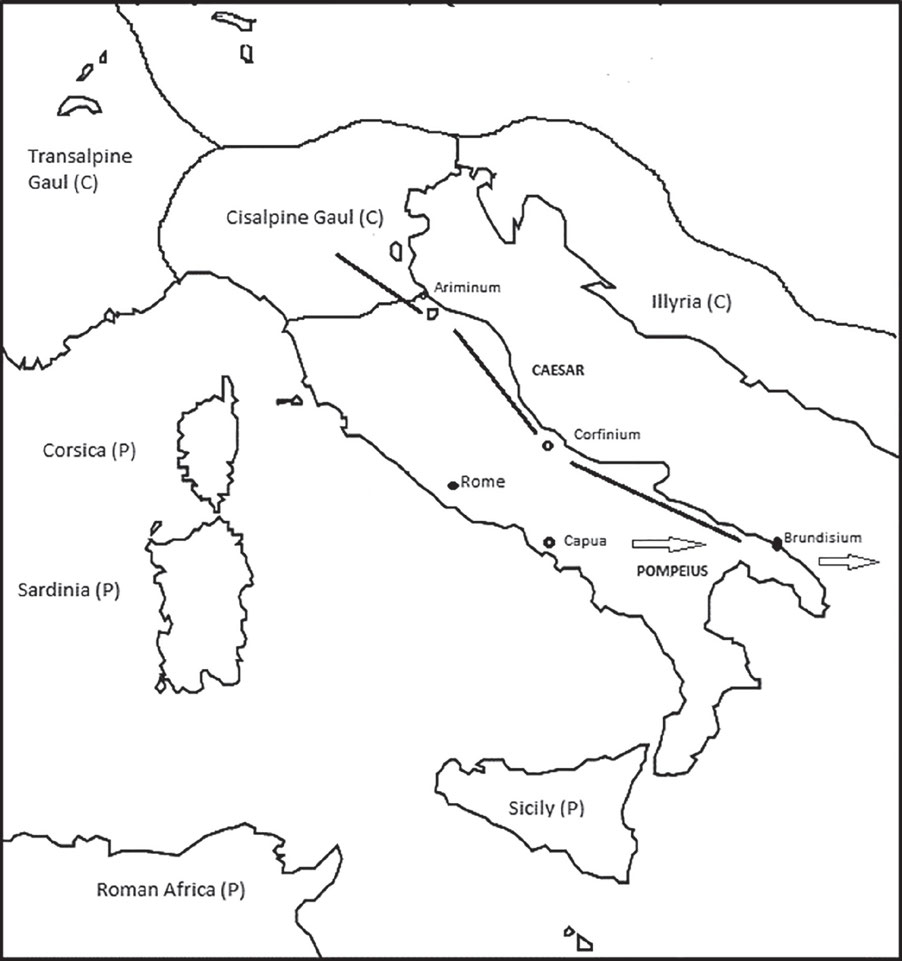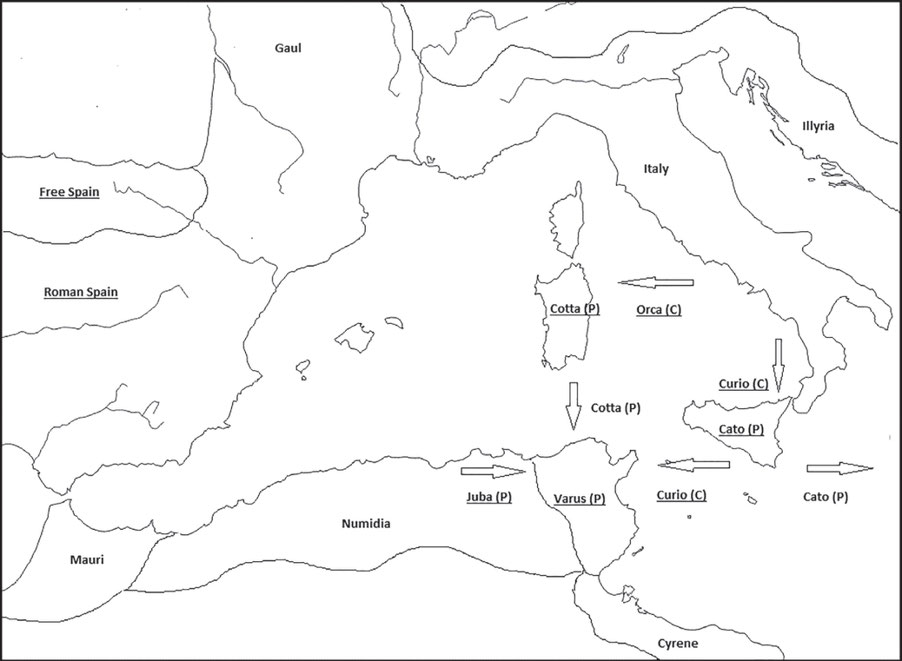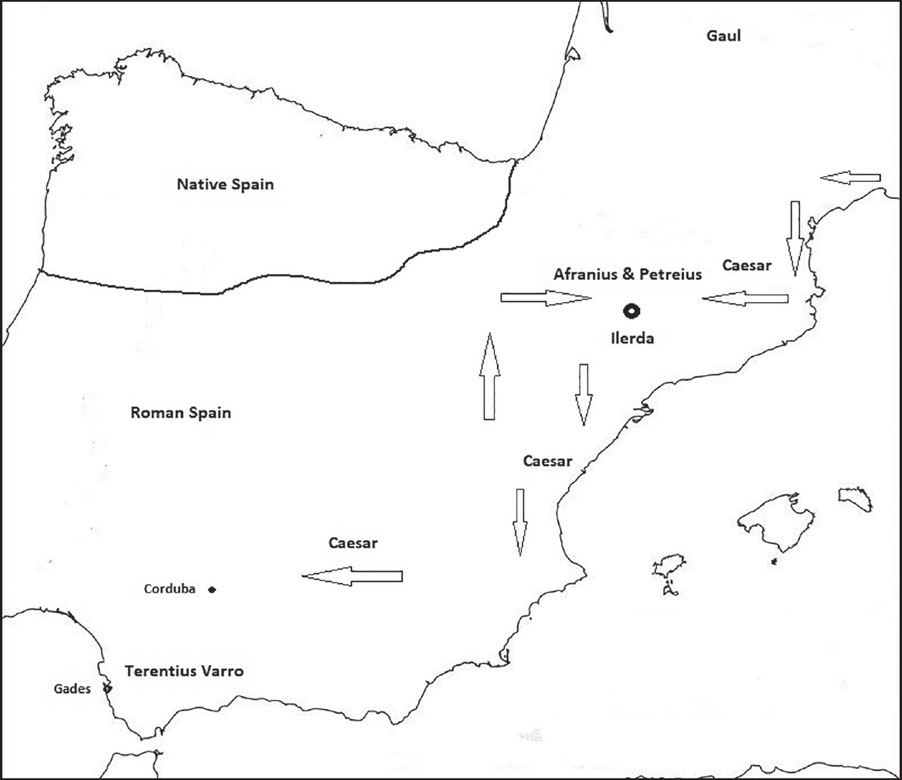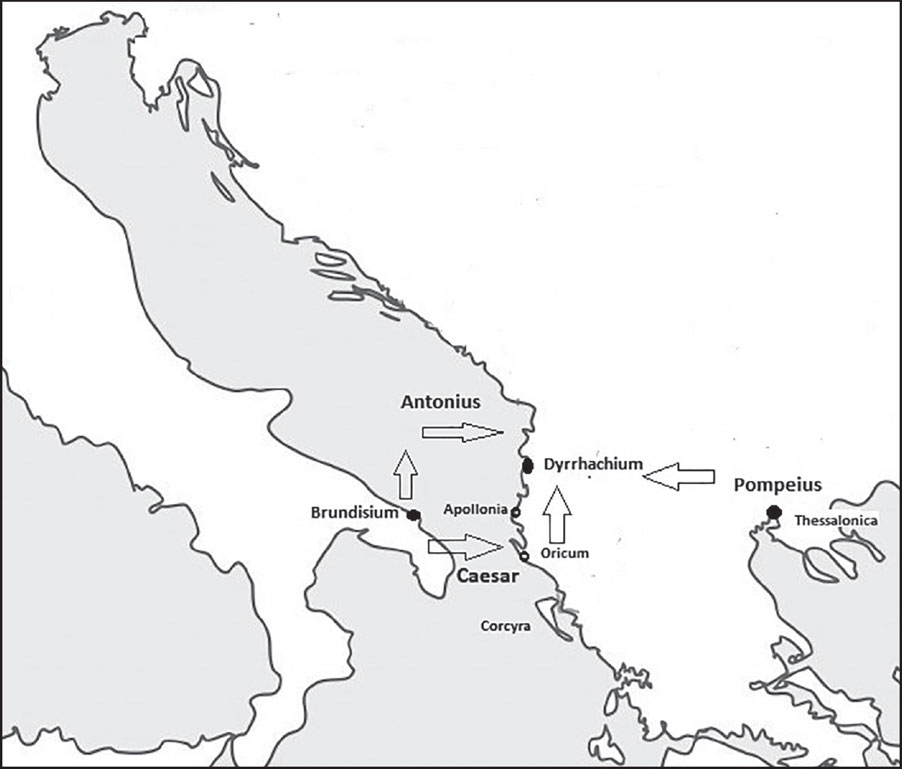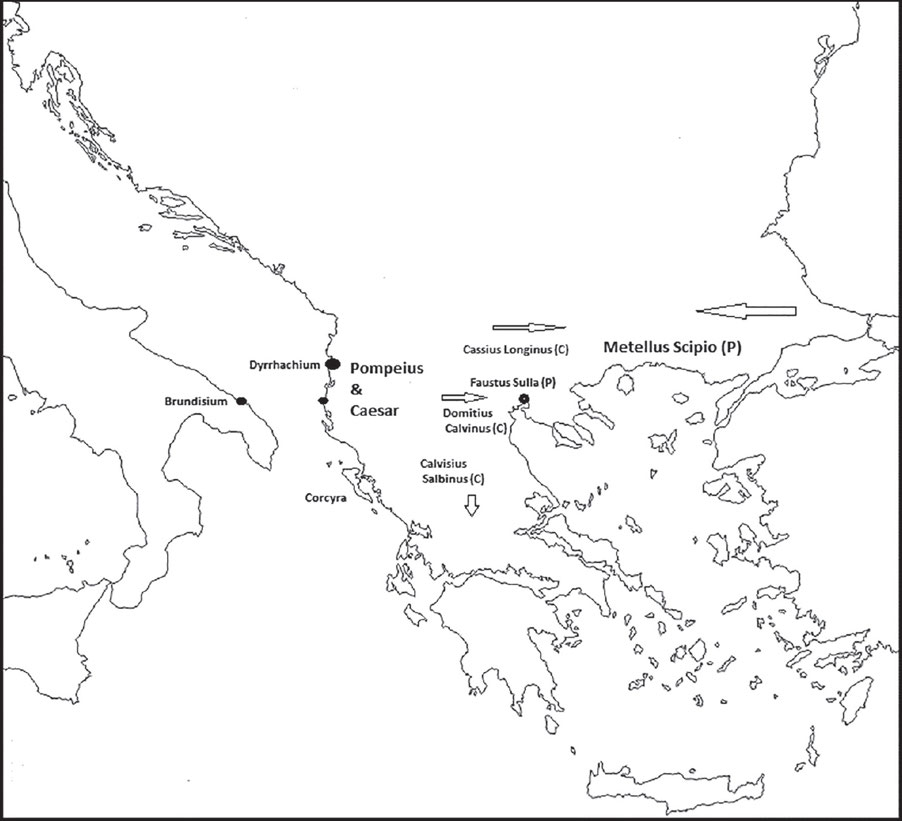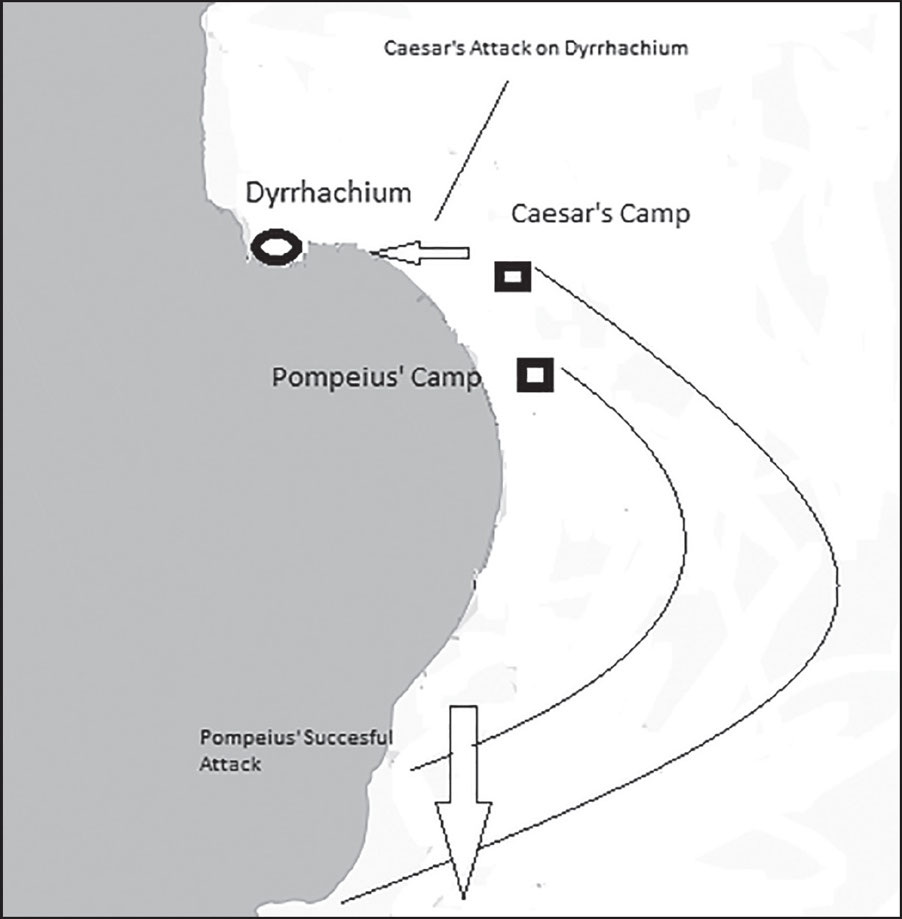The Battle of Dyrrhachium (48
BC
)
The Battle of Dyrrhachium (48 BC)
Caesar, Pompey, and the Early Campaigns of the Third Roman Civil War
Gareth C Sampson
First published in Great Britain in 2022 by
Pen & Sword Military
An imprint of
Pen & Sword Books Ltd
Yorkshire Philadelphia
Copyright Gareth C Sampson 2022
ISBN 978 1 52679 358 4
eISBN 978 1 52679 359 1
The right of Gareth C Sampson to be identified as Author of this work has been asserted by him in accordance with the Copyright, Designs and Patents Act 1988.
A CIP catalogue record for this book is available from the British Library.
All rights reserved. No part of this book may be reproduced or transmitted in any form or by any means, electronic or mechanical including photocopying, recording or by any information storage and retrieval system, without permission from the Publisher in writing.
Pen & Sword Books Limited incorporates the imprints of Atlas, Archaeology, Aviation, Discovery, Family History, Fiction, History, Maritime, Military, Military Classics, Politics, Select, Transport, True Crime, Air World, Frontline Publishing, Leo Cooper, Remember
When, Seaforth Publishing, The Praetorian Press, Wharncliffe Local History, Wharncliffe Transport, Wharncliffe True Crime and White Owl.
For a complete list of Pen & Sword titles please contact
PEN & SWORD BOOKS LIMITED
47 Church Street, Barnsley, South Yorkshire, S70 2AS, England
E-mail: enquiries@pen-and-sword.co.uk
Website: www.pen-and-sword.co.uk
Or
PEN AND SWORD BOOKS
1950 Lawrence Rd, Havertown, PA 19083, USA
E-mail: Uspen-and-sword@casematepublishers.com
Website: www.penandswordbooks.com
In loving memory of Geoff Sampson (19472019)
Contents
Acknowledgements
As always, the first and greatest acknowledgement must go out to my wonderful wife Alex, without whose support and understanding none of this would be possible. Next must come Thomas and Caitlin, who are a constant source of joy and anxiety.
Special thanks go out to my parents who always encouraged a love of books and learning (even if they did regret the house being filled with books). My father Geoff is no longer with us, and his loss is still felt by us all.
There are a number of individuals who through the years have inspired the love of Roman history in me and mentored me along the way; Michael Gracey at William Hulme, David Shotter at Lancaster and Tim Cornell at Manchester. My heartfelt thanks go out to them all.
A shout goes out to the remaining members of the Manchester diaspora: Gary, Ian, Jason, Sam. Those were good days; we will not see their like again.
As always, my thanks go out to my editor Phil Sidnell, for his patience and understanding.
It must also be said that as an Independent Academic, the job of researching these works is being made easier by the internet, so Alumnus access to JSTOR (Manchester and Lancaster) and Academia.edu must get a round of thanks also.
List of Illustrations
Map 1.
Map 2. The Italian Campaign.
Map 3. The Western Mediterranean Campaigns.
Map 4. The Spanish Campaigns.
Map 5. The Epirote / Illyrian Campaigns.
Map 6. The Greek & Macedonian Campaigns.
Map 7. The Dyrrhachium Campaign.
Introduction
The Defeat that Never Was
When is a defeat in battle not a defeat in battle? When the loser gets to write the history books. This sums up nicely the situation that we find in July 48
BC
when the Roman Republics two greatest living generals met in battle for the first time, in the Republics Third Civil War. The two men in question were none other than Cn. Pompeius Magnus (Pompey the Great) and C. Iulius Caesar. Having fought each other by proxy for over a year the two generals finally met in battle at the Epirote city of Dyrrhachium (modern Durres in Albania).
The outcome was clear at the time: Caesar was defeated by Pompeius and had his army routed, and was lucky to escape with his life. Appian best sums this up with the statement they fought one great battle in which Pompeius defeated Caesar in the most brilliant manner and pursued his men in headlong flight to his camp and took many of his standards. Thus, in the first major clash between these two legendary rivals, Pompeius defeated Caesar.
Yet, subsequent events namely the Battle of Pharsalus the following month, and Caesars own attempts to write the history of the campaign have obscured this defeat and relegated it to its modern status of a minor reversal before the main event. This work seeks to reverse this process, overcome the Caesarian propaganda, both ancient and modern, and restore the battle to its rightful place in the history of the civil wars; namely a Caesarian defeat, and one that clearly highlighted both the defects in Caesars own generalship, namely a rashness on the battlefield, and the abilities of Pompeius.
Even without the final outcome, the battle itself is a most noteworthy one, with this clash not being a traditional open battle between two Roman armies but taking the form of a months long siege and counter siege between two armies that had both dug in on the Bay of Dyrrhachium and were conducting an ancient form of trench warfare. The battle itself was the result of a month-long period of manoeuvre and counter manoeuvre in Epirus and Illyria between the two generals, with Caesar eager to give battle and Pompeius preferring to wait until he judged the time to be right.
This process neatly encapsulates the whole preceding eighteen months of campaigning which had begun when Caesar had been manipulated into famously crossing the Rubicon and confirming his status as an enemy of the Senate and People of Rome. The campaigns that followed highlighted the two totally opposing styles of Romes two leading generals slow and calculating versus bold and impetuous and completely showcased each mans talents and flaws in one conflict, with control of the Republic going to the winner.
This work will not only analyse the background to and tactics of the Battle of Dyrrhachium itself but will seek to place it in its proper context as the culmination of an eighteen-month series of tactical campaigns across the Western Mediterranean between the Caesarian and Pompeian armies, ranging from Spain to Africa to the Adriatic. It will also showcase the differing tactical abilities of the two commanders in their battle for supremacy in the Roman Republic.
Next page
